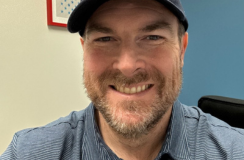fter starting Ellsworth Partners with a business partner and acquiring several businesses, Elliott Holland moved to smaller acquisitions through Spartan Capital.
He was looking for due diligence firms dedicated to small and medium-sized businesses, but couldn’t find any.
So five years ago, he started Guardian Due Diligence, a due diligence solutions company. So far this year, the company has done about 30 deals.
In this episode of Acquiring Minds, Elliott shares a list of things he wishes he knew before he started in acquisitions. He explains the importance of fighting through the mindset of getting everything perfect — especially the LOI. His view is that perfect is the enemy of the good and that knowledge — and actually closing a deal — only comes from putting in the reps.
“I encourage people to think of each failed attempt not as oh my gosh, that failed, but as one less failure en route to success.”
New acquisition entrepreneurs will likely be surprised to learn that the information gathered before the LOI is often not 100% accurate — far from it.
That doesn’t mean the deal is not worth doing, however. It’s only once you dig into the financials after submitting your (imperfect!) LOI that you’ll be able get a better understanding of the business and its financial position.
Trust has to be earned with a seller, and Elliott shares some of the reasons why a seller might be hesitant to trust a buyer even after accepting the LOI. Patience is always critical.
Listen in as Elliott explains the importance of due diligence, learning from failure, how pre-LOI is theory and post-LOI is practice, and how much murkiness is acceptable in a notoriously murky process.
Check out:
✳️ Top takeaways from the episode
✳️ Episode highlights with timestamps

Acquisition Entrepreneur: Elliott Holland
💵 What he acquired: Elliott acquired multiple businesses through Ellsworth Partners, a private equity firm he started with his mentor. They acquired an automotive parts business, a tow truck business, and a clinical trials business. His next step was Spartan Capital doing smaller deals ($500,000-$2M). During that time, he couldn’t find any dedicated due diligence solutions for small and medium-sized businesses. In 2016, he started Guardian Due Diligence to be the solution he wished he’d had.
💡 Key quote: “When you start looking at three-page summaries of businesses ... that have been around 30 years, just know you don't know squat. When you get into diligence, you get the bank statements, the customer list, accounts receivable, the list of employees — now you have enough data to understand the business. But you're gonna find out things post-LOI that were represented in the summary pre-LOI, but you never could have understood them accurately before.”
👋 Where to find him: LinkedIn

Acquisition Tips From the Episode
Top takeaways from this conversation
💪🏾 Get those LOI reps in to gain experience (and ultimately close a deal).
One of the things Elliott’s noticed throughout his experience with acquisitions is the hesitation searchers have around writing an LOI.
When you’re putting together million-dollar valuations, there’s a lot of pressure around writing the “perfect” LOI. This trepidation doesn’t serve acquisition entrepreneurs. The only way to get good at writing an LOI is by actually doing it — a lot.
“There's just so many things you learn post-letter of intent. I almost think the pre-letter of intent time was almost like drawing up a play on a clipboard … To get good, you need reps.”
🧂 Take everything pre-LOI with a grain of salt.
Part of the reason Elliott advises people to just write the darn LOI, is because the information provided before that is just a snapshot and doesn’t offer substantial information about how the business is actually doing.
Plus, not every broker is an expert on the specific industry, so the information provided in the CIM can be off by as much as 40%.
“For every dollar that you see, you have to think it could be 60 cents, or $1.40,” says Elliott. “Don't kick out deals just because the number isn't exactly what you want. Because if it's in that range, you might still want to go to the next step.”
🤐 The seller has no reason to trust you yet.
Even after the LOI is accepted, Elliott regularly sees sellers dragging their feet on getting information to the buyer for due diligence before the QoE comes in. This can often be a tell that the seller doesn’t yet trust the buyer, which can be for various reasons.
“We put our website up. We went to these fancy schools. We have these fancy investors and so the world should respect us,” Elliott says, referring to the attitude of a young buyer.
“And you go and talk to a person that spent 30 years in the business, put kids through college, paid mortgages, had a very, very tough time paying payroll. You're just some young kid that may be able to put the money together,” Elliott says.
“What does that mean for your process? It means that there may be things that day one, the seller’s not willing to give you or tell you, and that he's not really in a position to be 100% clear on why. But after you've earned some trust, and got into the process, he will be more willing to give.”
Episode Highlights
Inflection points from the show
[1:54] Getting in the game: While getting his MBA from Harvard, Elliott got into private equity investing and convinced a mentor to partner with him. They started Ellsworth Partners, focusing on small and medium-sized deals. Later, Elliott focused more on acquisition entrepreneurship deals ($500,000-$2M) under Spartan Capital. He realized there weren’t many dedicated due diligence solutions for small and medium-sized businesses.
[3:52] The issues with accountants: When accountants come from auditing, they’re focused on finding imperfections. But in small and medium-sized acquisitions, everything is imperfect, so accountants will often recommend against every deal. They don't have the correct mindset to properly advise buyers in the messy world of small business acquisition.
[6:06] The foundation of due diligence: Elliott explains what goes into a Quality of Earnings (QoE) report and why it’s vital to understanding a business’s financials. “It’s essentially everything you need to know about a private business before you make an investment in it,” he says.
[10:03] Acquiring a business is a lot: When buying a business, there’s a lot to do as a buyer. “During a full due diligence process … an acquisition entrepreneur is wearing at least 10 hats,” says Elliott. Between building trust with the seller, thinking about growth, talking to lenders, and more, he explains why even buyers with experience should outsource due diligence work.
[12:03] Write the darn letter of intent: After you’ve received the confidential information memorandum (CIM) and signed an NDA, and you’re putting together the valuations, it’s easy to get caught up in hesitation with the LOI and aim for perfection. The only way to get good at writing an LOI is to actually do it.
[14:44] ‘To get good you need reps’: There are so many things you can only learn by going through the process of a business acquisition — even if it doesn’t work out. Elliott wants people to think of each failed acquisition attempt as experience en route to success.
[16:17] The first information packet is +/- 40%: For many reasons, a lot of the information provided early in the acquisition process (like the CIM) isn’t 100% accurate. This can be a shock at first, but it isn’t necessarily a reason to pass on a deal.
[21:20] Bring in the due diligence consultant: People looking to acquire a business can’t engage a due diligence firm for every deal that merely seems interesting. When you get serious enough about a deal that you start writing up your LOI, that is when Elliott recommends getting in touch with a due diligence specialist.
[22:58] You have no idea until post-LOI: After submitting your LOI, you’ll get much more detail, information that previously was represented in a skimpy three-page summary. Naturally, that kind of summary can’t provide a full picture of the business, especially one that is decades old.
[25:08] A line in the sand: Elliott talks about how much murkiness in the data he is willing to accept, and how you know when due diligence is over.
[28:37] Seller trust: Just because the LOI is accepted, doesn’t mean the seller trusts you or has any reason to do anything legal until you have the QoE report. Elliott expands on why that’s the case and how to read between the lines.
[33:28] Small biz acquisition landscape: While the small business acquisition space is blossoming, there are just more tire kickers now, but the number of qualified buyers hasn’t actually changed much.
[34:45] Use calls to bother people: When you’re trying to get more information for due diligence but the seller isn’t cooperating, a great technique is to schedule a call and walk them through your due diligence checklist in painstaking detail. They’ll get impatient and send you the information you desire just to get off the phone.
[37:04] The importance of humility: During due diligence, the buyer should recognize that they’re earning the trust and the right to be the owner of the business.
[41:33] Where to find a deal: Elliott gives his thoughts on BizBuySell, and other, more nuanced ways to find acquisitions.
Links & Mentions
✅ You Can't Teach a Kid to Ride a Bike at a Seminar
✅ Nick Haschka









%20-%20thumbnail.png)






%20-%20thumbnail.png)



%20-%20thumbnail.png)

.png)




%20-%20thumbnail.png)















%20-%20thumbnail.png)































































